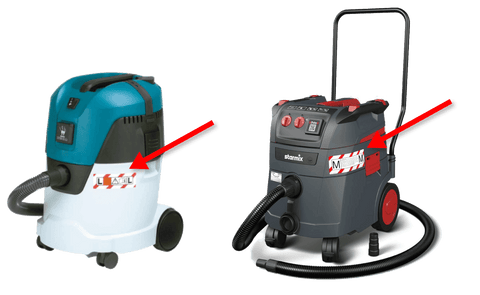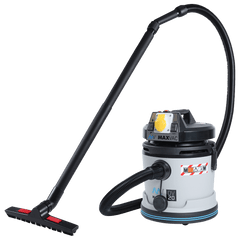We all know the ordinary domestic vacuum just won't cut it in a workshop. Something more robust is needed.
Before we begin its worth asking a few questions:
- What’s the size of the workshop?
- What sort of debris or dust are you dealing with?
- Does the vacuum need to be connected to a power tool or device?
- What’s your budget?
Sadly there isn’t a ‘one size fits all‘ solution but what follows is a guide, that will give you the information you need to find the ideal vacuum for your specific requirements.
1. Drum Capacity and Bags
Choosing a workshop vacuum with a suitable drum capacity is a good place to start.
A larger machine:
- Will be able to hold more debris
- It will not need emptying as often as a smaller one
- Will be cheaper on bags as they won’t need to be replaced as often
- May be more suited to for CNC machines and other equipment that creates a lot of dust or chippings
But you also need to think about how and where you are going to store it.
Maybe your workshop doesn't have the space for a larger machine. Or perhaps the kind of work you do doesn't create all that much waste so you’re only using a vacuum for short intervals a couple times per day.
In which case, maybe a machine with a smaller capacity might be more suitable for you.
2. Unit Size and Weight
Closely related to the capacity of your workshop vacuum are its size and weight. Yes, a larger workshop vacuum has its benefits, but you may want a smaller one if:
- The workshop area that needs cleaning is smaller or filled with machinery and other equipment.
- You want 1 vacuum per machine
- You don't have the space to store a larger vacuum
- You don’t need to use your vacuum so frequently
- Its needs to be light enough to take with you
You do not want to unnecessarily manoeuvre an overweight vacuum around your small workshop as you will be constantly banging it against benches, tools and other equipment, and risk damaging something. And neither do you want it left out in the middle of your workshop because there is no space to store it.
Smaller machines can perform many of the same functions as their larger cousins can. Its best to list in order of priority what you need from your vacuum before choosing the size, the smaller vacuum options may surprise you.

3. Suction Power
If the vacuum has a stronger motor, it will generally also have better suction and it's wise to remember that vacuums with larger drums do not always have a large suction power.
However how suction power is measured can be confusing:
- Air Flow rate (typically measured in litres/second)
- Depression Value or kPa (often measured in inches of water the vacuum can lift)
- Air velocity (measured in metres/second or kph)
To determine suction power it’s best to look at the “Air Flow Rate” and “Depression” values.
This is a good starting point and will give you a clear indication of how powerful the device is. The higher the number the higher the suction power.
|
The MAXVAC DV80-LBN
|
4. Filtration Class
Power is irrelevant if your vacuum doesn’t have the correct filtration in place to capture the finer dust and debris in your workshop. The finer the dust the more damage it can cause to your lungs.
For a workshop vacuum, we would strongly recommend choosing one with a HEPA filter.
Additionally if you want your vacuum to meet HSE standards, you should avoid ones with L class extraction (L stands for Low). The minimum legal requirement in many workplace environments is M class (and you may want to opt for one with H class extraction, which can filter even finer particles).
- M stands for Medium Hazardous Dust
- H stands for High Hazardous Dust

5. Auto filter cleaning
If you’re vacuuming for extended periods of time, or dealing with large quantities of dust, you should be purchasing a workshop vacuum with an automatic filter cleaning function such as on the Starmix ipulse Safeplus Vacuum or the MAXVAC DV35-MBA with SMARTclean filters.
As the name suggests, both of these vacuums have intelligent filters that automatically clean whilst continuing to vacuum. The significant advantage of this is that the filters stay clear allowing the vacuum to maintain great airflow without the need to regularly stop and unclog the filter.
This does come at an extra cost, and it may be an "unnecessary extra" if you only need to clean up a small workshop once or twice a day.
Other Considerations
- Do you want a wet/dry vacuum that can clear up spillages as well as debris?
- Do you want a vacuum with power tool activation, which allows you to control your vacuum's on/off switch?
- Can you attach your vacuum to your tools so it collects the particles as you work?
- How noisy is the vacuum (essential if you are working in a smaller space)?
- Do you require a vacuum that can blow as well as suck?
- How easy is it to empty the vacuum?
- Should your vacuum have alarms that let you know when it is full or something needs attention?
Conclusion
The best way to find the ideal workshop vacuum is to use the many questions asked above and determine what are your ‘essential’ requirements and what would be ‘nice to have’ features, and then see what your budget allows.
Alternately, if you're still not 100% sure what the optimal solution is for your requirements, give us a call on 0800 980 0105 and we'll be very happy to discuss your requirements and offer free advice.
















